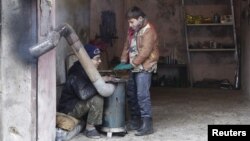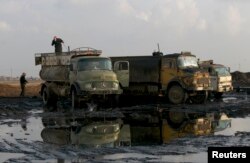Wracked by civil war and Islamic State occupation, Syrians living in areas under Kurdish or rebel control are suffering from a major shortage of heating fuel in an unusually harsh winter.
People in the Kurdish region of northern Syria say they have been running low on heating supplies for more than a week.
Many households “don’t even have a drop of fuel anymore,” said Marwan Khanke, 35, a father of three children who lives in the Kurdish city of Qamishli in northeastern Syria. “The last time we had a running heater at home was 10 days ago.”
The Syrian regime keeps a tight monopoly on oil transports, ensuring areas under government control receive adequate hearting supplies, experts say. A loose network of oil smuggling allows rebels and Kurds to get limited access to supplies, they say. And along smuggling routes, each side takes a cut of the profits, which drives up transport costs and prices to consumers.
“There are many actors involved in the fighting,” said Hosheng Ose, a Kurdish affairs analyst in the region. “This affects the availability of many goods, including fuel.”
Black market
The black market makes for some seemingly contradictory business alliances, experts say. Even as the regime battles IS in some areas, middlemen from both sides profit in an illicit oil trade.
Despite oil fields and facilities being bombed alternatively by Syrian allied forces on one side and by the US.-led coalition on another, IS continues to be successful in producing oil and selling it to other parties, including businessmen affiliated with the Syrian government, analysts said.
IS “is not only fuel sufficient, it also has the ability to sell it to the [Syrian] regime,” said Tammam Baroudi, an economist at the Syrian Economic Forum. IS has imposed high taxes on oil-laden trucks using routes under its control, analysts say.
Kurds in northern Syria are appalled as the fuel shortages exist even as they live near oil wells controlled by Kurdish authorities. But local reports said that much of the oil extracted from the Kurdish region is being transported to government-held areas, leaving local Kurds with a shortage of heating commodities.
Kurdish officials could not be reached for comment by VOA. They have not spoken to local media as protests erupted among residents against the shortages this week.
Kurdish officials have said in the past that oil sales have largely helped them fund their fight against IS. Backed by the U.S.-led coalition, Kurdish forces have been engaged in taking back territory from IS in northern Syria
Caught in the middle
But locals say the lack of fuel for local consumption undermines efforts to sustain self-sufficiency.
“How could you sell oil to the Assad regime, if your own population is in desperate need for it?” analyst Ose asked.
But the Kurdish region, administered largely by the Democratic Union Party (PYD), is not entirely independent when it comes to economic dealings, according to some locals.
“The Syrian regime can still force the local Kurdish administration to sell raw oil to dealers in government-held areas,” said Barzan Sheikhmous, a local journalist based in the town of Amude.
He said the PYD “is also sending fuel to areas recently liberated from [IS], such as Manbij and areas in western Raqqa because they can sell it [at] a much higher price there.”
Residents in areas controlled by Turkish-backed rebels in parts of Aleppo province are voicing similar complaints about shortages of heating supplies and skyrocketing prices of fuel.
“While we have bad-quality fuel at the market, prices are rising on a daily basis,” said Isam, 31, a resident of the town of Marea, who asked that his last name not be used due to safety concerns.
“We are at the mercy of fuel dealers who take advantage of our needs,” he said.





